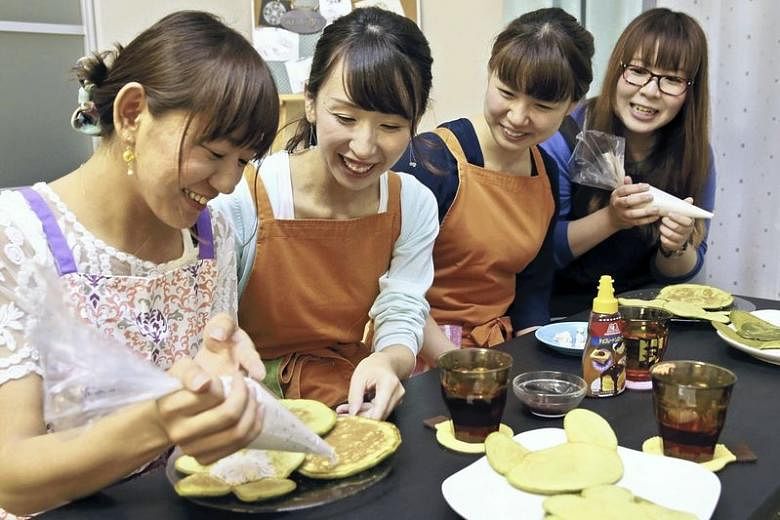TOKYO (Yomiuri Shimbun/Asia News Network) - A growing number of young Japanese are pursuing parallel careers, holding down a regular job while also integrating other work or social activities into their lives in hopes of greater fulfillment.
Toshihiko Yamasaki, 34, works at en Factory, Inc., a company based in Shibuya Ward, Tokyo, where he manages a website that sells interior design goods. At the same time, he also runs his own business making and selling products for small dogs.
Yamasaki's dog-related business started when his wife Akiko began making clothes for their four-year-old pug Jiro, as they couldn't find clothers for their flat-nosed pet.
Sensing a demand for clothes for such breeds, the couple launched an online shop in 2013 called Hanapecha Ya, which roughly translates as "house of the flat-nosed". It sells products such as tank tops, one-piece outfits and pillows for dogs to rest their chins on.
Akiko designs and makes the products, Jiro models them and Toshihiko takes the pictures and operates the site.
Their custom-made outfits have received good reviews. The site gets about 30 orders a month, including some from overseas, which bring in about ¥300,000 (S$4,052).
The couple smiled together as they said it was rewarding making things from scratch.
However, Toshihiko's main job is handling emails and calls from customers and managing the inventory at en Factory. He leaves for work at 10 a.m. and gets home around 10 p.m. on weekdays, so does he pursue his side job only on weekends?
SIDELINES ENCOURAGED
"Even on weekdays, I sometimes update the Hanapecha Ya site at home until around 2 am [after coming home from work]. At work, I'm frequently in touch with my wife about customer questions on sizes and other things," he said.
Is it alright to engage in a side business at work? Surprisingly, Yamasaki said yes.
"My company bans employees from devoting themselves only to their work at the company. Employees are encouraged to engage in parallel work," he said.
Kenta Kato, 50, president of en Factory, said that in the highly competitive world of online business, "We'd rather have workers who can survive on their own than people who can only function at a company."
The company was founded in 2011 and has about 25 employees, mostly in their 20s and 30s.
Employees of en Factory have side jobs as disaster preparedness advisors, new business planners and so on. Half the workers do work for their own clients at the en Factory office.
The prohibition on work specialisation is designed to benefit both the company and its workers. In one typical example, a former employee turned a side job selling miscellaneous goods online into an independent business, and is working with en Factory to develop new opportunities.
PART-TIME CHEF
UP is an incorporated organisation based in Kita Ward, Osaka, that promotes parallel careers. Its name is an abbreviation of "unlimited potential."
The entity currently has about 200 members, including employees of major companies and nurses. It provides members with office space, and hosts networking events where members are given the opportunity to fund one another's initiatives.
Parallel careers that UP has supported include a systems engineer engaged in farming, and a licenced childcare worker running a disaster recovery project.
UP member Miho Kihara, 29, conducts cooking classes at her apartment. She studied bookkeeping in high school, then began her current career at a tax accountant's office.
But she always loved making sweets, so she took cooking classes to learn about recipes.
She once taught classes on nights and weekends at a major cooking school for several tens of thousands of yen per month, but had to quit after a few months when she got busy with her main job.
When she joined UP, she met two women - one a researcher, the other a nutritionist - who also wanted to open a cooking school. Two years ago, they started teaching classes in Kihara's condominium.
She only teaches once a month so it does not interfere with her main job. Students pay from ¥1,000 to ¥1,500 per class, which mostly goes towards ingredients, recipe printouts and other costs.
Still, Kihara said she finds fulfillment in the cooking classes.
"I'm surrounded by my friends, and it's encouraging when a student says to me, 'Making sweets is fun,'" she said.

